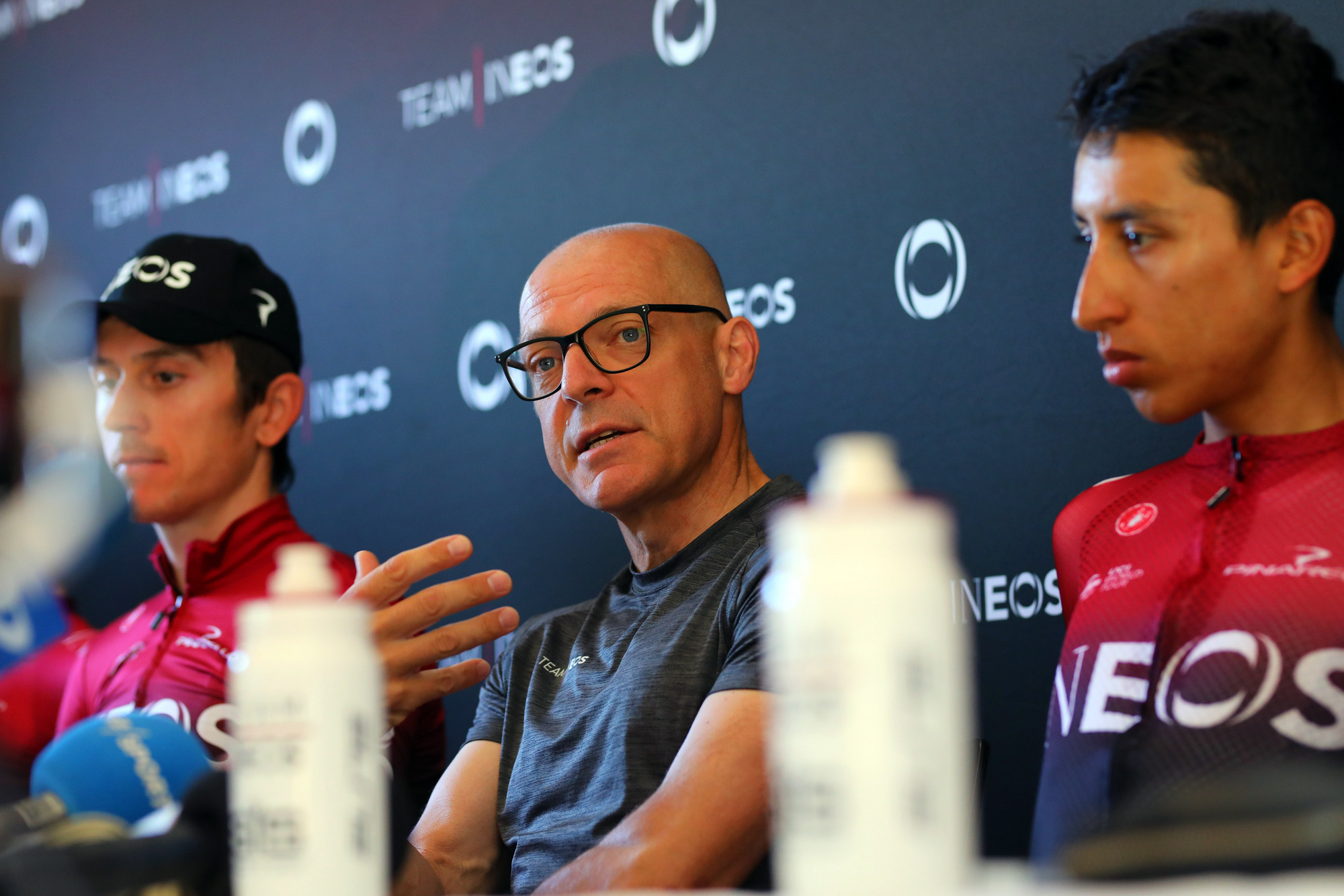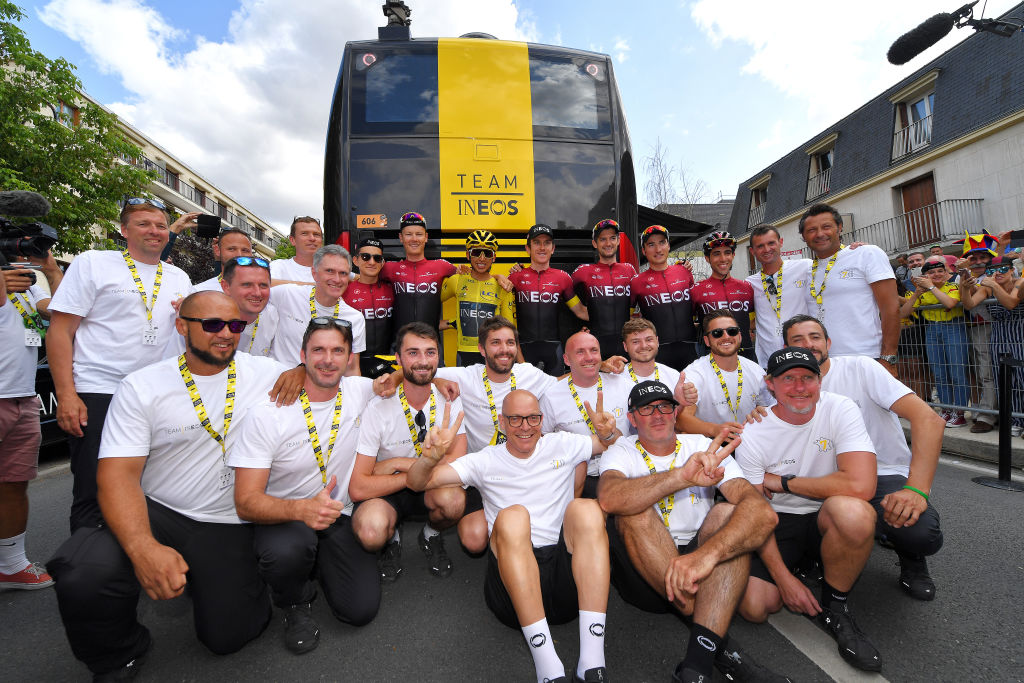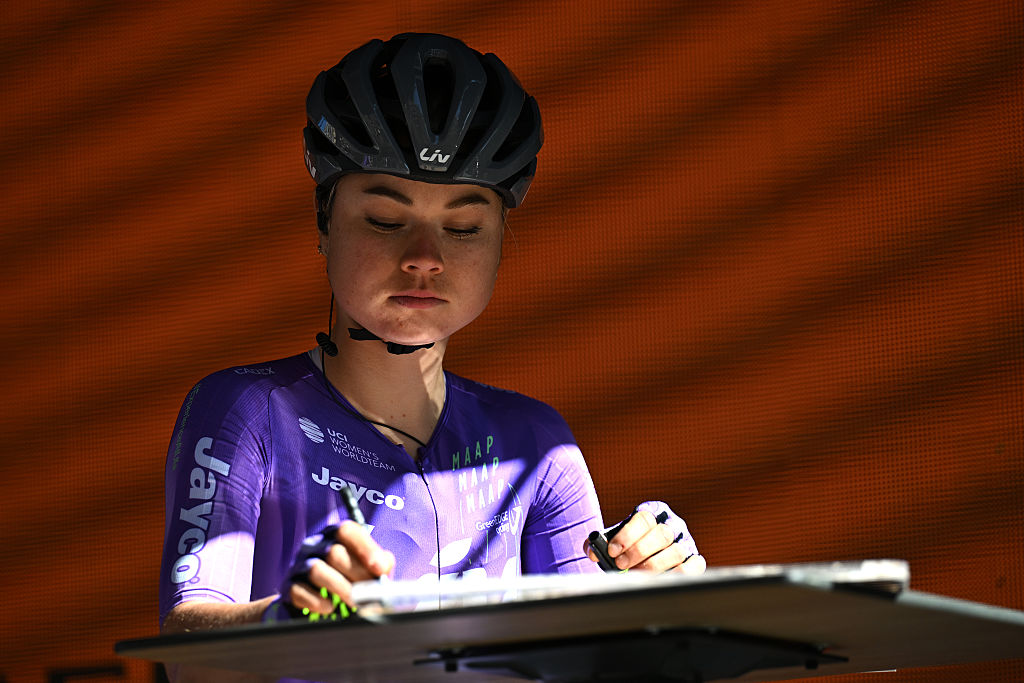Philippa York: Would I have ridden for Team Ineos?
Dave Brailsford gives York his sell on joining the team

The latest race content, interviews, features, reviews and expert buying guides, direct to your inbox!
You are now subscribed
Your newsletter sign-up was successful
Every now and then I get asked whether I would have ridden for Team Sky and Team Ineos had I been born 25 years later. Basically, those that ask want to know if I would have fitted into the modern system and coped with the demands asked of modern riders.
However, that question creates a couple of assumptions. Firstly, and probably the easiest to imagine, is that when the British team was being set up they would have wanted to recruit as many home riders as possible, with a good amount of UCI points. Therefore, if I was a top 15 rider, and had a pile of points, then it's fairly obvious that an interest in obtaining my services would have been likely.
But negotiations and interest in moving from one team to another isn't just a one-way thing. The rider has to be enthused by a team or project, too. Therefore, when I hear the 'how would I have fitted into the Sky/Ineos way of doing things?' I immediately think the person is making a fundamental mistake because they have thought that I as a rider would have been interested. Assumptions are dangerous things to make.
Putting that to one side, let's assume that Dave Brailsford and his team had shown interest in me. My background in terms of the teams I'd ridden for until that point would have shaped my view because my type of rider – small, a climber and not track orientated – would mean I wouldn't have been part of the British Cycling Olympic set-up.
That was a medal gathering exercise and as a road rider I would have been left out of that. At best I would have had a take it or leave attitude to the whole British Cycling and Team Sky partnership.
Then, if I was in the top 15 or 20 professional riders in the world I'd have been pretty sure of what I wanted from any team. I would have been living in Europe and properly settled into the lifestyle. There's nothing to suggest I would have been open to changing what I was doing and who I was riding with.
The notion of signing for a British team with that history of previous neglect towards me and my own personal journey to riding at the highest level would have meant that signing for them wouldn't have been the sure thing everyone thinks it might have been.
The latest race content, interviews, features, reviews and expert buying guides, direct to your inbox!
Sell it to me, Dave
At the recent Tour of Britain I approached Dave Brailsford and asked him how he would have taken on the matter of attracting me to the team.
"I guess there's a big difference between the Olympic sports and trying to achieve success in the Olympic arena and then the professional, week in week out, sports," he said.
"The track was very much governed by medals, and getting more medals. Basically it's a meritocratic system and that was geared towards optimising the budget that we had, towards supporting riders who could achieve Olympic medals and that was phase one. We [at British Cycling – Ed.] didn't have that much to do with professional cycling at the time but as time moved on we started to think about creating a young rider Academy.
"That's where Cavendish and Geraint Thomas went. So we went to Italy and Rod Ellingworth went to Italy and we embedded them in there. But then it became a passion of mine to think actually we have the Olympic arena but what about the Tour de France, what about professional racing? Why couldn't we create a WorldTour-level team."
"Then, when it came to say who are we going to sign, what are we trying to do, without a shadow of a doubt we would have looked round the British riders and without a doubt we would have tried to sign you for the team."

I politely interrupt and remind him that I would have arrived where I did with very little British Cycling interaction and that the lure of more money wouldn't have been a deciding factor.
Ambition counts for a lot and it was, and no doubt remains, a fundamental point when it came to changing teams, especially when I was at my peak.
"Absolutely. I think to be fair to a lot of riders, particularly on the way up at the level that you were performing, riders will look at different teams and they will look at the structure and what opportunity it gives them. At the time we would have created some kind of performance plan saying how we would have looked at it. We would explain this is how we work and our philosophy," he tells me.
"Ultimately at the highest level it's not a one-way street. Dictator control is a management style and that's over. You have to empower people now, and take ownership.
"You have experts who are coaches but equally you have got to give belief. They have to buy in and believe in what they are doing. Particularly in the training. You have genuinely got to believe in it so there's a negotiation around if this could be a good idea and what do you think.
"Then there'd be a negotiation and off we'd go. It's a constant dialogue. It's not a one-way ticket or a take it or leave it. Do your ambitions and goals marry up with the teams? How do we set about to achieve it? It's hardly ever 'we'll do this', or 'you can come to us and we'll do that'."
I point out that the way he's describing the negotiations wasn't the norm back in my days of racing, especially when he mentioned the dictatorship that effectively managed cycling at that period.
"No, not the norm before maybe but it's a coaching approach nowadays. The way we'll work now towards the end of the season, for example, is we'll sit down and have a look back.
"Each coach with each one of the riders and we'll look at what went well and what didn't and they'll ask what do you want from next year? What are your goals and dreams, what do you want not what do we want? We identify their objectives , their goals."
"Then it's like piecing together a jigsaw. We'll have it next year. With the riders we have next year who wants what race and what program will best suit those. Will it be Giro/Tour, Tour/Vuelta and how are we going to do that.
"Some people are going to have a preference and somebody will say I want to do this and some people will say I want to do this and I don't want to lose all my opportunities so you have to find ways of fitting that all together."
"Over time we'll slowly but surely piece together everyone's plans and we kind of get an idea what everyone game plan is. Of course, with crashes and things, that can change quite quickly.
"As we've seen this year with Egan Bernal. Egan won the Tour this year, actually he was meant to be riding the Giro but he crashed just before it. Then all of a sudden he's in the Tour and winning the Tour. At the start of the year that's not what his season looked like. You have to be pretty flexible."
We ended it there, with my knowledge of the process greatly improved. I particularly liked the bit about the end of the dictatorship style. I'd had enough of that confidence removal stuff 30 years ago.
The more personal approach, or to put it in modern terms 'rider-centric coaching', was good too, as that was something only the favoured riders enjoyed in my time, and being one of the chosen ones and one of the team's protected riders wasn't always a given. I was quite surprised Team Ineos had the time and resources frankly, but then they do have the budget to cover all the details.
The performance expectations and commitment levels to new methods of training wouldn't have worried me too much either as that level of scrutiny was something most top riders had.
So with that in mind there's still the question to be answered – would I have signed on the dotted line?
Well... that would be telling wouldn't it?
Philippa York is a long-standing Cyclingnews contributor, providing expert racing analysis. As one of the early British racers to take the plunge and relocate to France with the famed ACBB club in the 1980's, she was the inspiration for a generation of racing cyclists – and cycling fans – from the UK.
The Glaswegian gained a contract with Peugeot in 1980, making her Tour de France debut in 1983 and taking a solo win in Bagnères-de-Luchon in the Pyrenees, the mountain range which would prove a happy hunting ground throughout her Tour career.
The following year's race would prove to be one of her finest seasons, becoming the first rider from the UK to win the polka dot jersey at the Tour, whilst also becoming Britain's highest-ever placed GC finisher with 4th spot.
She finished runner-up at the Vuelta a España in 1985 and 1986, to Pedro Delgado and Álvaro Pino respectively, and at the Giro d'Italia in 1987. Stage race victories include the Volta a Catalunya (1985), Tour of Britain (1989) and Critérium du Dauphiné Libéré (1990). York retired from professional cycling as reigning British champion following the collapse of Le Groupement in 1995.

